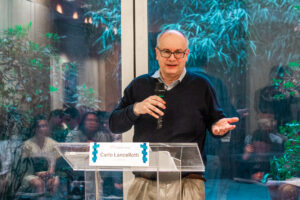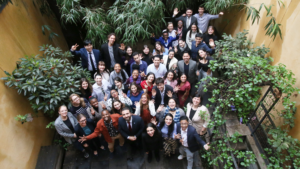“One of the biggest public health challenges that we face is the demographic transition globally.”- Dr. Douglas Noble
 The 10th Annual International Solidarity Forum opened with an insightful lecture and discussion on Sustainable Development and the Healthcare system given by Dr. Douglas Noble. During the presentation, he explained that one of the major challenges to public health is the demographic transition experienced globally, which refers to a change in birth and death rates. As countries develop, they move through various stages of demographic transition, from virtually stagnant rates (high birth and death rates) to rapid growth (high birth, low death), and then to a stable low growth rate in birth and death. However, Dr. Noble significantly highlighted the phenomenon across Western Europe, Japan, and the USA: an increasingly ageing, elderly population with unsustainable replacement birth rates. Closing, he posed this question: what can you do to engage policy makers on this issue to seek a lasting solution?
The 10th Annual International Solidarity Forum opened with an insightful lecture and discussion on Sustainable Development and the Healthcare system given by Dr. Douglas Noble. During the presentation, he explained that one of the major challenges to public health is the demographic transition experienced globally, which refers to a change in birth and death rates. As countries develop, they move through various stages of demographic transition, from virtually stagnant rates (high birth and death rates) to rapid growth (high birth, low death), and then to a stable low growth rate in birth and death. However, Dr. Noble significantly highlighted the phenomenon across Western Europe, Japan, and the USA: an increasingly ageing, elderly population with unsustainable replacement birth rates. Closing, he posed this question: what can you do to engage policy makers on this issue to seek a lasting solution?
Yes, we can discuss the economic puzzle of fewer workers, higher taxation, and a large dependent, retired, and older community or the question of universal health care, especially in light of an older population in need of accessible and quality health care. These are important issues to be investigated and solved. But I would like to explore what I believe is at the heart of the issue: a renewal of culture—a renewal of the understanding of the family and of fertility.
Nicholas Eberstadt stated: “The biggest determinant of family size is how many children women say they want” (see WYA White Paper on Sustainable Development). Of course, there are such factors as financial situation and resources available that play a part in determination of family size. Yet if is it culturally undesirable to have many children, family size adjusts accordingly and women tend to have less children. However, if it is socially acceptable and encouraged to have children, women will more naturally choose to want to have more children.
However, it is not as simple as positive cultural norms and pressures that encourage larger family size that will solve the low birth rates in many developed (and developing) countries. Rather, it calls for a renewal of the understanding of the human person and the family. In the WYA charter, we affirm the family as the fundamental unit of human society and that the political community, at all levels, is obliged to protect and nurture the family. If having children is understood within the integral whole of the family, a place in which authentic development and flourishing of the person can occur, there is incentive to have children and more of them. This is not because of any financial perks or a sense of duty to have kids, but rather arises from the family, from the parents, who recognize the inviolable dignity of the child they have brought into the world and provide the proper place, the family, in which to nurture the child.
The renewal of culture begins with the renewal of each one of us who learn to see again the intrinsic dignity of the human person and the gift of new life.
By Lenore Healy, an intern at WYA HQ.







